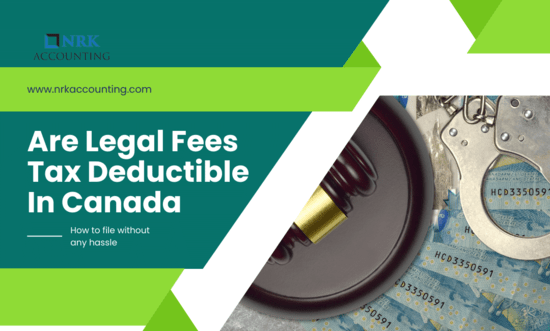Are Legal Fees Tax Deductible In Canada
Legal fees can feel like the final kick when you’re already down. But what if those hefty bills could lighten your tax burden? Turns out, there are cases where you can deduct legal fees in Canada.
Want to know if those lawyer invoices can work in your favor? We’ll unravel:
- Which types of legal fees are deductible
- Situations where deductions apply
- How to claim those deductions on your taxes
Struggling with tax deductions? NRK Accounting can help. We’re a team of Toronto-based accountants who know the ins and outs of Canadian tax law. Let’s maximize your deductions and minimize your stress.
Which Types of Legal Fees Are Deductible?
Legal expenses can pile up quickly. Thankfully, Canada’s tax system recognizes this and grants some avenues for deducting those costs under certain circumstances. Let’s break down the key areas where you might be able to lighten that financial load thanks to your legal bills:
Protecting Your Income and Benefits
- Unpaid Wages or Employment Income: Fighting for the pay you earned? Legal fees associated with recouping owed wages, commissions, bonuses, and other employment income are deductible.
- Pensions and Retirement Allowances: If you spent money on lawyers to secure your pension or a retiring allowance, you can claim those fees.
- CRA Disputes and Objections: Fees paid for legal advice and assistance when dealing with the CRA can be deducted. This includes objecting to or appealing assessments for things like income tax, employment insurance, or pension plans.
Note: In some cases, you may need to reduce your deduction claim if you were reimbursed for any of your legal expenses.
Keep meticulous records. Detailed receipts and supporting documentation will be vital when filing your taxes and claiming any deductions.
Situations Where Legal Deductions Apply
Beyond the employment income scenarios we explored earlier, legal fees can be deducted in other situations as well. Let’s dive into some key ones outlined by the Canada Revenue Agency (CRA):
- Responding to the CRA: If you ever find yourself needing professional help navigating interactions with the CRA regarding your income, deductions, or credits, the fees associated with that assistance can be deducted on your tax return.
- Objecting to Assessments: Think you’ve been hit with an unfair assessment? The good news is that legal fees you incur while objecting to or appealing an assessment or decision made under the Income Tax Act, the Employment Insurance Act, the Canada Pension Plan or the Quebec Pension Plan are deductible.
- Collecting or Establishing Pension Rights: Legal fees paid to secure or establish your right to a pension or retiring allowance can also be claimed on your taxes. There’s a catch, though: the amount you can deduct is capped at the amount you actually received in the year, minus any portion that was transferred to a registered retirement savings plan (RRSP) or registered pension plan (RRP).
Remember, meticulous record-keeping is essential! The CRA might request documentation to support your deductions, so be sure to hang on to those receipts and any other relevant paperwork.
Where to Claim
Let’s talk about how to actually claim those legal fee deductions on your Canadian taxes. Here’s the breakdown:
- Salaried Employees: If your legal fees are related to employment income, you claim them on Form T777: Statement of Employment Expenses. Here’s how:
- Enter the fees on line 8862 (Accounting and legal fees)
- On line 22900 of your tax return, report the total allowable amount of your employment expenses from Form T777.
- Other Deductible Scenarios: If your legal fees fall into the categories like responding to the CRA, objecting to assessments, or collecting pensions, you’ll claim them on line 23200 of your tax return under “Other Deductions”.
Important Notes
- Reimbursements Matter: If a court or any other body awarded you money to cover legal fees, you must reduce your deduction by the amount you received.
- Child Support Special Case: This one’s trickier! Legal fees paid to make child support payments non-taxable can’t be deducted right away. Instead, these fees become part of a special seven-year carryforward claim.
If your legal fee situation is complex or involves multiple scenarios, consulting a tax professional is your best bet. They can help you ensure you’re maximizing your deductions and correctly claiming everything on your tax return.
Ready to Tackle Your Tax Deductions?
We’ve covered a lot of ground, and you should be feeling a lot more confident about navigating those legal fee deductions!
- Here’s a quick recap of what you’ve learned:
- Legal fees related to employment income are often deductible.
- You can deduct fees incurred while dealing with the CRA or objecting to assessments.
- Legal fees tied to collecting or establishing pensions can also be claimed.
Feeling overwhelmed or unsure if your specific situation qualifies? That’s where NRK Accounting comes in. Our team of tax professionals is dedicated to helping individuals and businesses like yours minimize tax burdens and maximize returns. We know the ins and outs of tax deductions, and we’re here to help you make the most of them!

